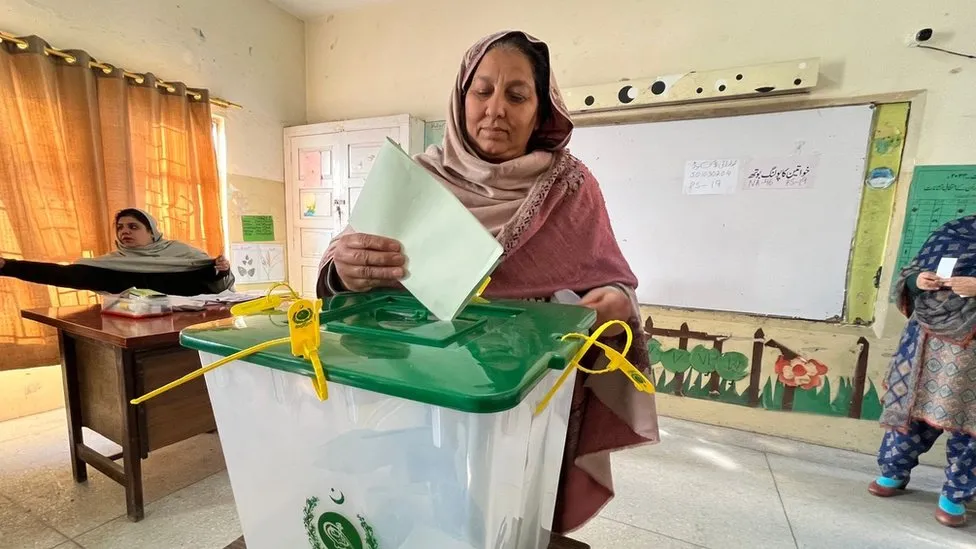
Pakistan election: Internet access cut off as controversial polls begin
Pakistan has temporarily suspended mobile services as millions head to the polls to vote in a new government.
An interior ministry spokesman said the measure was warranted, citing recent incidents of terror in the country.
The election comes almost two years since the previous prime minister, cricketer-turned-politician Imran Khan, was ousted in a no-confidence vote.
Three-time PM Nawaz Sharif is now on the ballot in what many analysts say is Pakistan’s least credible election yet.
Both calls and data services have been suspended, though Wifi networks still appear to be working.
One voter told the BBC they were shocked at the decision, saying “voters should be facilitated instead of [having to be met with] such hurdles”.
Another said she was expecting a blanket shut down.
Many voters in the city of Lahore told the BBC that the internet blackout meant it was not possible to book taxis to go and vote, while others said they couldn’t chat to other family members to co-ordinate when to head to polling stations.
Justifying the move, an Interior Ministry spokesman said, “As a result of the recent incidents of terrorism in the country, precious lives have been lost. Security measures are essential to maintain law and order situation and to deal with potential threats”.
Two bomb blasts killed 28 people in the restive Balochistan province on Wednesday.
The shutdown was also criticised by Bilawal Bhutto Zadari, son of murdered ex-Prime Minister Benazir Bhutto, who called for services to be restored “immediately”. Mr Bhutto, who is also running for the top job, said his Pakistan People’s Party (PPP) had approached the election commission and the courts to get services restored.
The country is on high alert, with heavy security presence at polling stations across the country. One station in Lahore had armed guards at the entrance and army officers roaming around the area.
Border crossings with Afghanistan and Iran have been closed for both cargo and pedestrians to “ensure full security” during polling, a spokesman from Pakistan’s foreign ministry said.
Strict rules around election coverage – including what can be said about candidates, campaigning and opinion polls – remain in place until the end of voting at 1700 local time (1200 GMT). Its unclear how soon results will be announced but they must be released within two weeks of the vote.
The country has in the past shut down the internet to control the flow of information – though a shutdown of this extent is unprecedented, especially during an election.
Outside one polling station in the city of Multan in Punjab, some female polling agents told the BBC they were not allowed to enter polling booths – and therefore could not observe the polling process.
Typically, female polling agents are given a seat inside booths.
In Lahore, dozens of voters crammed into the small corridors of a school in Naseerabad, with some saying they had been waiting for more than two hours to vote.
Rising violence and economic struggles
As many as 128 million people are registered to cast their votes, almost half of whom are under the age of 35. More than 5,000 candidates – of whom just 313 are women – are contesting the 336 seats up for grans in this election.
The Pakistan Muslim League (Nawaz) (PML-N) and the PPP are considered the two major parties going into the vote.
However, picking out candidates from Khan’s Pakistan Tehreek-e-Insaf (PTI) party is more difficult, after it was banned from using the cricket bat symbol under which all its candidates run.
The move has forced PTI-backed candidates, who are running as independents, to use other symbols instead, including calculators, electric heaters and dice. Electoral symbols play a key role in a country where more than 40% are unable to read.
The PTI allege other tactics have also been used to prevent their candidates from winning seats, including locking up PTI members and supporters and banning them from holding rallies, effectively forcing them underground.
Khan was jailed on corruption charges and is barred from standing. He is serving at least 14 years in prison, having been sentenced in three separate cases in the space of five days last week. The PTI alleges interference by Pakistan’s powerful military, with whom Khan is said to have fallen out before his ousting and imprisonment.
But people will be able to vote for Nawaz Sharif – the PML-N leader, who at the time of the last election was beginning a sentence for corruption.
The former PM was ousted in a 1999 military coup and had his third term cut short in 2017 – but he recently returned from self-imposed exile and had his lifetime ban on holding office overturned, and also got his criminal record wiped clean at the end of last year, allowing him to stand for what would be a record fourth term
However, whether any party can win a majority – which requires 169 seats in the 336-seat National Assembly – is not yet clear.
Millions have been hit hard by the country’s economic woes, which were exacerbated by devastating floods in 2022. Inflation is soaring, and people are struggling to pay their bills.
According to the Islamabad-based Center for Research and Security Studies (CRSS), 2023 also saw violent incidents increase for the third year in a row in Pakistan, with the most recorded fatalities – including security forces, militants and civilians – since 2017.
On Wednesday – less than 24 hours before the first voters cast their ballots – two separate attacks on candidates’ offices left more than 28 people dead in Balochistan province.
The Election Commission of Pakistan has categorised half of the 90,675 polling stations as either “sensitive”, meaning there is a risk of violence, or “most sensitive”, indicating a higher risk. The classifications are based on the region’s security situation and history of electoral violence.
Source ( BBC News )




